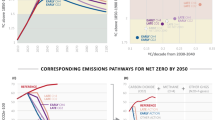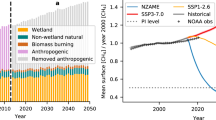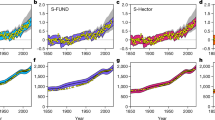Abstract
The PAGE95 integrated assessment model is used to calculate the marginal benefit of immediate cutbacks in methane emissions, and compare them with the benefits of carbon dioxide reductions and the costs of methane reduction measures. The main result is that immediate cutbacks of methane bring a marginal benefit of between $30 and $260 per tonne, with a mean value of $110 per tonne. This compares to a benefit of between $10 and $50 per tonne of carbon, with a mean value of $20, for immediate cutbacks of carbon dioxide (all values in 1990 dollars). A sectoral and regional breakdown finds that two-thirds of the benefit is non-economic and only about 5% of the benefit occurs in the European Union (EU) and 8% in the USA; the vast majority of the benefit is felt in other regions, particularly in the developing world. Analysis up to 2200 shows the benefit continuing throughout the next century, peaking after 2050, even though methane stays in the atmosphere for only about a decade. This is because the surface-troposphere system typically takes decades to regain equilibrium, owing principally to the thermal inertia of the oceans. Exploring a range of alternative assumptions shows that the benefit from methane reduction is most sensitive to the discount rate. Using a pure time preference rate of 2% per yr instead of 3% per yr, almost doubles the mean benefit to $190 per tonne; a rate of 1% per yr doubles the mean benefit again to $380 per tonne.
Similar content being viewed by others
References
Albritton, D. L. and Meira Filho, L. G. 2001, Technical Summary in Houghton, J. et al. (ed.), IPCC Working Group I 2001, Climate Change 2001: The Scientific Basis, Cambridge, Cambridge University Press.
CRU/ERL: 1992, ‘Economic Evaluation of Impacts and Adaptive Measures in the European Community’, Commission of the European Communities, DG XI, Brussels.
EIA: 2001, http://www.eia.doe.gov, US Government Energy Information Administration.
Fankhauser, S.: 1994a, Valuing Climate Change. The Economics of the Greenhouse Effect, Earthscan, London.
Fankhauser, S.: 1994b, ‘The Social Costs of Greenhouse Gas Emissions: An Expected Value Approach’, Energy J 15(2), 157–184.
Hansen, J., Fung, I., Lacis, A., Rind, D., Lebedeff, S., Ruedy, R., and Russell, G.: 1988, Global Climate Changes as Forecast by Goddard Institute for Space Studies Three Dimensional Model, J. Geophys. Res 93, 9341–9364.
Hayhoe, K., Jai, A., Pitcher, H., MacCracken, C., Gibbs, M., Wuebbles, D., Harvey, R., and Kruger, D.:1999, ‘Costs of Multigreenhouse Gas Reduction Targets for the USA’, Science 286, 905-906.
Houghton, J. T., Jenkins, G. J., and Ephraums, J. J. (eds.): 1990, Climate Change: The IPCC Scientific Assessment, Cambridge University Press, Cambridge.
IEA: 1998, Abatement of Methane Emissions, IEA Greenhouse Gas R&D Programme, report compiled by Moore, S., Freund, P., Riemer, P., and Smith, A.
Lind, R. C. (ed.): 1982, Discounting for Time and Risk in Energy Policy, Resources for the Future, Washington.
Manne, A. S. and Richels, R. G.: 2001, ‘An Alternative Approach to Establishing Trade-Offs Among Greenhouse Gases’, Nature 410, 675–677.
Morgan, M. G. and Dowlatabadi, H.: 1996, ‘Learning from Integrated Assessment of Climate Change’, Climatic Change 34(3/4), 337–368.
Nakicenovic, N., Swart, R. (eds.): 2000, IPCC Special Report on Emissions Scenarios, Cambridge University Press, Cambridge.
Nordhaus, W. D.: 1993a, ‘Optimal Greenhouse Gas Reductions and Tax Policy in the “DICE” Model’, American Economic Review, Papers and Proceedings 83, 313–317.
Nordhaus, W. D.: 1993b, ‘Rolling the “DICE”: An Optimal Transition Path for Controlling Greenhouse Gases’, Res. Energy Econ 15, 27–50.
Peck, S. C. and Teisberg, T. J.: 1993a, ‘CO2 Emissions Control: Comparing Policy Instruments’, Energy Policy 21, 222–230.
Peck, S. C. and Teisberg, T. J.: 1993b, ‘Global Warming Uncertainties and the Value of Information: An Analysis Using CETA’, Res. Energy Econ 15, 71–97.
Plambeck, E. L. and Hope, C. W.: 1995, ‘Validation and initial results for the updated PAGE model’, Research Papers in Management Studies 1994–1995, no. 15, University of Cambridge, UK.
Plambeck, E. L. and Hope, C. W.: 1996, ‘PAGE95. An Updated Valuation of the Impacts of Global Warming’, Energy Policy 24(9), 783–794.
Plambeck, E. L., Hope, C. W. and Anderson, J.: 1997, ‘The PAGE95 Model: Integrating the Science and Economics of Global Warming’, Energy Econ 19, 77–101.
Prather, M. and Ehhalt, D.: 2001, Atmospheric Chemistry and Greenhouse Gases, Chapter 4 of Houghton, J. et al.: IPCC Working Group I (2001), Climate Change 2001: The Scientific Basis, Cambridge University Press, Cambridge.
Ramaswamy, V.: 2001, Radiative Forcing of Climate Change, Chapter 6 of Houghton J et al, IPCC Working Group I (2001), Climate Change 2001: The Scientific Basis, Cambridge University Press, Cambridge.
Schneider, S. H.: 1997, ‘Integrated Assessment Modeling of Global Climate Change’, Environ. Model. Assess 2(4), 229–249.
Smith, J. B., Schellnhuber, H.-J., and Mirza, M. M. Q.: 2001, Vulnerability to Climate Change and Reasons for Concern: A synthesis, Chapter 19 of McCarthy J. et al., IPCC Working Group II (2001), Climate Change 2001: Impacts, Adaptation and Vulnerability, Cambridge University Press, Cambridge.
Tol, R. S. J.: 1995, ‘The Damage Costs of Climate Change-Toward More Comprehensive Calculations’, Environ. Res. Econ 5, 353–374.
Author information
Authors and Affiliations
Corresponding author
Rights and permissions
About this article
Cite this article
Hope, C. The Climate Change Benefits of Reducing Methane Emissions. Climatic Change 68, 21–39 (2005). https://doi.org/10.1007/s10584-005-1052-1
Received:
Revised:
Issue Date:
DOI: https://doi.org/10.1007/s10584-005-1052-1




